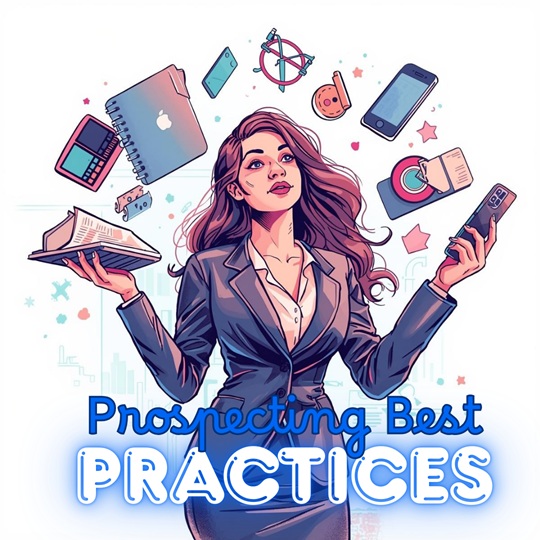Embarking on a career as a Sales Development Representative (SDR) can be an exhilarating and challenging experience. As the first point of contact for potential customers, SDRs play a crucial role in driving sales growth. However, success in this role requires a strategic approach and an understanding of potential pitfalls that can hinder your progress.
In this blog post, we will explore ten common mistakes to avoid as a new SDR, helping you set yourself up for success.
Related: The Ultimate Guide to Land a Job in Tech Sales
Neglecting research
Neglecting research as a new Sales Development Representative (SDR) is like trying to navigate a maze blindfolded.
You might stumble upon the exit eventually, but it'll take a lot longer, and you're likely to hit dead ends along the way.
Research is your compass; it helps you understand your prospects, their pain points, and how your product or service can be the solution they've been searching for. Without it, you're just shooting in the dark and hoping something sticks.
So, embrace the research—it's your secret weapon in the world of sales!
Related: Sales Intelligence Tools
Failing to research your target market, industry, and potential customers can be detrimental to your success as an SDR.
Take the time to understand your prospects' pain points, industry trends, and the competitive landscape. This knowledge will enable you to engage in meaningful conversations and provide relevant solutions.
Over reliance on scripts
Your sales script is not a holy text. It's more like a helpful guide.
Relying too heavily on scripts can turn your sales pitch into a robotic monologue rather than a genuine conversation.
People appreciate authenticity. If you're just reading off a script, you might miss out on the nuances of a real interaction.
Each prospect is unique, and sticking strictly to a script might cause you to overlook their specific needs or concerns.
Flexibility and adaptability are key in sales. Use your scripts to understand the key points, but let the conversation flow naturally based on the prospect's responses. That way, you'll build genuine connections and increase your chances of making a lasting impression.
Related: Importance of Sales Scripts
While scripts can provide structure and guidance, relying too heavily on them can make your interactions sound robotic and impersonal. Instead, focus on understanding the needs of your prospects and develop the ability to have natural, meaningful conversations that address their specific pain points.
Ignoring qualification
Neglecting qualification in sales is like playing darts blindfolded—you might hit the target occasionally, but you're more likely to miss the mark.
Qualifying leads helps you focus your efforts on prospects who are more likely to convert, saving time and resources.
Otherwise, you might find yourself chasing leads that are never going to pan out, wasting both your time and the company's resources.
Proper qualification ensures that you invest your energy where it matters most, increasing your chances of success and making you a more efficient and effective SDR.
Don't overlook the power of qualification—it's your compass in the vast landscape of potential leads.
Related: How to Qualify Leads
Qualifying leads is an essential part of the SDR role. Avoid the mistake of pursuing every lead without considering their fit with your product or service. Learn to identify potential prospects who are more likely to convert into customers, and prioritize your efforts accordingly.
Neglecting follow-ups
Neglecting follow-ups is like planting a seed and forgetting to water it—without consistent attention, it won't blossom into a fruitful tree.
Follow-ups are the lifeblood of sales; they show persistence, commitment, and a genuine interest in helping your prospects. If you drop the ball on follow-ups, you're missing out on opportunities to address concerns, provide additional information, and ultimately close the deal.
Sales is often about timing.
A well-timed follow-up can be the nudge your prospect needs to move forward.
It's not just about being a pest; it's about staying top-of-mind and building a relationship. So, don't let those leads wither away—water them with timely, thoughtful follow-ups and watch your sales garden flourish!
Many opportunities are lost due to a lack of persistence. Develop a consistent follow-up strategy to stay top of mind with your prospects.
A well-timed follow-up can often make the difference between a sale and a missed opportunity.
Failing to listen
Failing to listen in sales is like trying to solve a puzzle without looking at the pieces—it's bound to end in confusion and frustration.
Listening is a superpower in sales. It allows you to truly understand your prospect's needs, concerns, and priorities. If you're too busy talking over them or pushing your agenda, you risk missing vital information that could make or break a deal.
Effective communication is a two-way street, and listening is the key to unlocking meaningful conversations.
It builds trust, shows respect, and enables you to tailor your pitch to address the specific needs of your prospect. So, put on your metaphorical headphones and tune in to what your prospects are saying—it's the secret weapon that can turn a casual conversation into a successful sale.
Active listening is a critical skill for any SDR.
Resist the temptation to dominate the conversation and instead focus on understanding your prospect's pain points and challenges. By listening attentively, you can tailor your pitch and position your product or service as the solution they need.
Related: Power of Active Listening for Sales
Overpromising and underdelivering
Overpromising and underdelivering is like promising a gourmet meal and serving instant noodles—it leaves a bad taste in everyone's mouth.
As a new Sales Development Representative (SDR), your credibility is crucial. If you make grand promises that your product or service can't fulfill, you risk not only losing the sale but also damaging your reputation and the company's.
Set realistic expectations and deliver on them to build trust and foster long-term customer relationships.
On the flip side, overpromising might get you a quick win, but it's a short-sighted strategy that can lead to dissatisfied customers and lost opportunities in the long run.
So don't forcibly oversell—focus on what you can genuinely deliver, and you'll build a foundation for successful and sustainable sales.
As an SDR, your goal is to generate interest and secure meetings or demos. Avoid making promises that your product or service cannot fulfill.
Transparency and managing expectations are key to building trust with your prospects. Be honest about what your solution can deliver, and if necessary, involve your sales team to provide accurate information.
Lack of persistence
Lack of persistence in sales is like giving up on a treasure hunt after digging only a few inches—you might be inches away from striking gold, but you'll never know unless you keep going.
Persistence is the engine that drives successful sales. In the world of prospecting, not every call or email will result in an immediate sale. It takes time to build relationships and nurture leads.
If you throw in the towel too soon, you're leaving potential opportunities on the table.
Persistence is about resilience, learning from rejections, and continuously refining your approach. It shows your dedication to helping your prospects and demonstrates that you believe in the value of what you're offering.
Embrace the journey, keep knocking on doors, and you'll find that the more persistent you are, the more success you'll uncover as a new SDR.
Related: How to Overcome Sales Objections
Rejection is an inherent part of the SDR role. It's crucial to develop a resilient mindset and not let rejection discourage you. Maintain a positive attitude, learn from each rejection, and use it as an opportunity to refine your approach. Persistence is often the differentiating factor between successful and unsuccessful SDRs.
Not collaborating with the sales team
Not collaborating with the sales team is like trying to row a boat with one oar—you might make some progress, but you'll be moving in circles instead of reaching your destination efficiently.
Collaboration is the glue that holds a successful sales team together. As a new Sales Development Representative (SDR), working in isolation means missing out on valuable insights, strategies, and support.
The sales team is your ally—they've likely been in the field longer, faced similar challenges, and can provide guidance to navigate the intricacies of the sales process.
Through collaboration, you tap into a collective pool of knowledge, learn from each other's experiences, and ultimately enhance your effectiveness as an SDR.
Don't be a lone wolf; embrace collaboration and let the collective strength of the team propel you toward sales success.
Effective collaboration with the sales team is vital for SDR success. Aligning your efforts with the sales team's goals and sharing valuable insights can lead to improved strategies and better outcomes. Leverage their expertise, seek feedback, and work together to optimize the lead-to-customer conversion process.
Neglecting personal development
Neglecting personal development as a new Sales Development Representative (SDR) is like expecting to win a marathon without ever lacing up your running shoes.
Sales is a dynamic and ever-evolving field, and personal development is your training ground. If you don't invest in honing your skills, staying updated on industry trends, and expanding your knowledge, you risk falling behind the competition.
Continuous learning not only makes you a more effective SDR but also opens doors to new opportunities.
It's not just about product knowledge; it's about developing your communication, negotiation, and problem-solving skills.
Personal development is your ticket to staying relevant, adapting to changes, and ultimately excelling in the world of sales. So, grab those running shoes and embrace the journey of self-improvement—it's the path to long-term success.
Sales is a dynamic field, and continuous learning is essential. Invest time in improving your sales skills, studying industry trends, and understanding your product or service inside out.
Seek out mentors, attend relevant webinars or conferences, and stay updated with the latest sales methodologies and tools.
Forgetting to celebrate wins
Forgetting to celebrate wins as a new Sales Development Representative (SDR) is like running a race without acknowledging the finish line—you miss out on the joy of achievement and the motivation to keep going.
Celebrate wins, big or small. It boosts morale, creates a positive work environment, and fuels motivation.
Sales can be tough, and every closed deal or successful interaction is a victory worth acknowledging.
By celebrating wins, you not only recognize your efforts but also reinforce the idea that hard work pays off.
It's a reminder that you're making progress and that your contributions matter.
Don't overlook the importance of celebrating—whether it's a solo happy dance or a team celebration, take the time to savor your victories as they come.
Related: How to be a Great SDR
Sales can be demanding, and it's easy to get caught up in the pursuit of the next deal. However, celebrating your wins, no matter how small, is crucial for maintaining motivation and a positive mindset. Recognize your achievements, share success stories with your team, and use them as fuel to drive future success.
Conclusion
As a new SDR, avoiding common mistakes can help you establish a strong foundation for a successful career in sales. By conducting thorough research, focusing on meaningful conversations, maintaining persistence, and collaborating effectively, you'll be well on your way to achieving your sales targets. Embrace personal growth, listen attentively, and celebrate your wins along the way. Remember, each interaction is an opportunity to learn and improve, ultimately propelling you towards becoming a top-performing SDR.




















